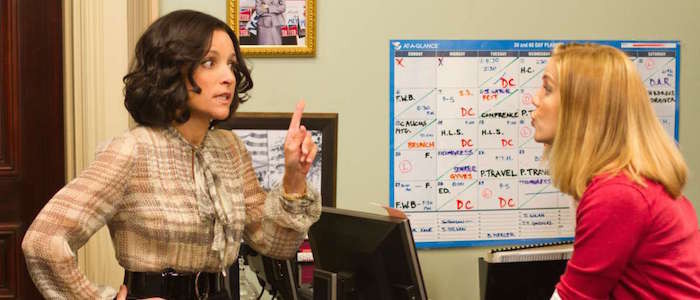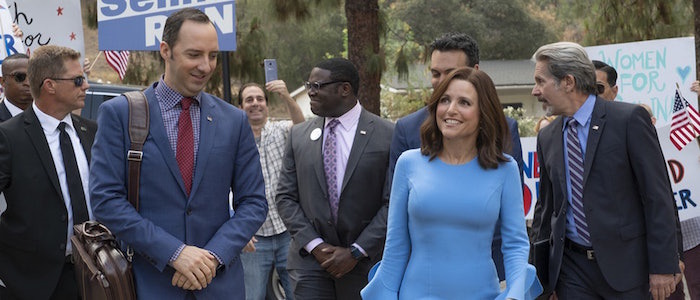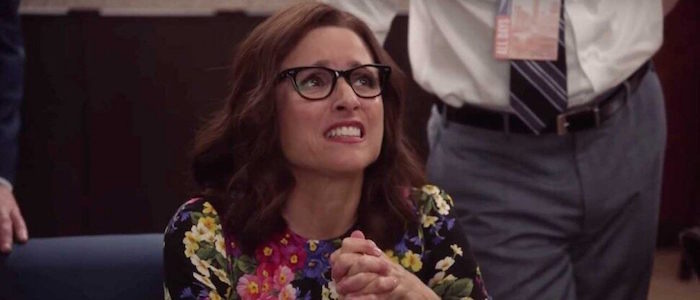The Only Thing More Brutal Than Last Night's 'Game Of Thrones' Was The Final Episode Of 'Veep'
On HBO last night, viewers watched in horror as a power-mad woman sold her soul and devastated a land she claimed to love in order to achieve maximum power at the expense of countless innocents. And there was also an episode of Game of Thrones where Daenerys Targaryen killed a bunch of people.
What? Did you think I was talking about Westeros? Heavens, no. I was talking about the United States of America and Selina Meyer, the lead character of Veep, whose desperate attempt to reclaim her power resulted in a series finale that was as brutal, as biting, and as deeply, powerfully sad as anything the political satire has ever done.
But much like the mad mother of dragons on the network's flagship series, Veep has been planting these seeds for the better part of a decade. We had front row seats to the creation of a monster, a super-villain, and a stain on a fictional (albeit modeled on our own) history. And while the series chose to reward Selina's absence of morals, ethics, decency, standards and so-on, it also provided what I hope Game of Thrones can do when it ends next week: it let us know how history treats the Selina Meyer legacy.
From this point onward, spoilers for the series finale of Veep are on the table.
In the Beginning
When Veep began in 2012, it could have been described, perhaps somewhat reductively, as The Office in the White House. Former congresswoman Selina Meyer's promising political career ground to a halt when she secured the second most powerful job in the world, Vice President of the United States, a job that also had the side effect of removing her ability to make any real decisions or affect any change whatsoever. So Selina was stuck in limbo, surrounded by crack political geniuses who had fallen on hard times and incompetents who had somehow managed to fail this far upwards. Those early seasons reveled in the mundane, as Selina tried to push her pet projects, made disastrous public appearances, and kept waiting, hoping, that the President would need her. Someday. Maybe.
All the while, Selina and her colleagues, friends and enemies shared barbs so twisted and cutting that if anyone ever wanted evidence of words breaking skin and shattering bones, they need to simply look to the foul and hilarious scripts of Veep.
But creator and original showrunner Armando Iannucci realized this concept could only go so far. Eventually, Selina's ambitions and hungers were rewarded. The President resigned in a scandal and she was elevated to the highest office in the land. And for a glorious moment, Selina Meyer was President Selina Meyer, free to fulfill her every ambition. But her abbreviated lame-duck presidency came to a swift end when she lost re-election (it's fitting with Veep's particular brand of satire that Selina spends more onscreen time trying to hold on to her presidency than actually governing) and found herself out in the wilderness – she had briefly held the highest office in the U.S.A., she had shattered the glass ceiling, and then she was gone before she could leave a proper impact. And once you've been president, once you've accomplished the end goal of every politician's dream, what do you do next?
Are We the Baddies?
In the case of Selina Meyer, it was rot and fester and let all of those already bad habits and nasty traits and desperate feelings overgrow an already compromised soul. Although Iannucci had departed Veep by this point in the series (and the show did indeed hit a few speed bumps along the way as it tried to find a fresh voice following his departure), the show maintained his bleak outlook and his penchant for amoral characters profiting from bad choices while leaving the metaphorical corpses of their enemies in their profanity-laden wake. The series had never turned away from Selina and her crew being a team of opportunists looking to accumulate power by any means necessary, but their hunger for it only grew once it was taken away. Once she left the Oval Office, Selina missed the power she had obtained and lost so quickly. It poisoned her. It transformed a morally questionable person into a burgeoning super-villain.
Many of Veep's early seasons built comedy from Selina's incompetence and the fact that her supposed crack squad of advisors fail as often as they succeed. But once everyone is weaponized by the taste of success, once the show's endgame became clear in its final years, the comedy shifted. Seemingly inspired by the brutal and surreal landscape of American politics in the Trump era (and how could it not be?), Veep stopped being a show about bumbling politicians who fail to get shit done and started being a show about vicious power players who use their personal vendettas and toxic baggage to declare war on a system, and a nation, that they think owes them anything and everything. Selina's transition from selfish goof we can't help but like to indefensible monster happens so slowly over the course of seven seasons that I imagine many viewers can't remember when they first realized the woman they've been watching for so long had become truly irredeemable. Shades of Breaking Bad and Walter White, which transformed a seemingly decent man into a villain with such ferocious patience that people rooted on a vile murderer for years before realizing the error of their ways.
Of course, all of this would have been impossible without the talents of Julia Louis-Dreyfus, giving the performance of her career and digging into that vulgar dialogue with an abandon that would make anyone's flesh twitch out of discomfort. It's extraordinary work, on par with the best acting ever seen on television. She makes Selina Meyer not just a comedy icon, but a television villain for the ages.
The final season of Veep is the broadest and silliest of the entire series, but it is also the darkest and most cutting, a whiplash that made me seasick on a weekly basis because the blend of overt ridiculousness and bleaker-than-bleak character decisions reeked of every single headline coming out of Washington D.C. in 2019. Selina claws her way back into the political race, choosing to run for president for the second term she never won. And she backstabs her friends and throws her family under the bus and works with foreign powers to rig primaries and strikes deals that threaten to irrevocably scorch the fabric of the United States because hey, words are just words and if it gets her into office, they can just vanish, right? And in the final stretch of episodes, Selina uses even more words than usual and makes even more vile promises and damns herself to oblivion in every other scene.
The Convention
The final episode of Veep takes place almost entirely in one room, the Meyer campaign's offices at their party's national convention in North Carolina, as they struggle to win over delegates, wheeling and dealing against the competition in a race crowded with men and women Selina has spent the entire series transforming into vicious rivals. If she had any soul left, we watch her sell it in these conversations, promising one candidate that she will outlaw gay marriage if it means securing his endorsement and asking Jonah Ryan, long-established by the series to be the literal Worst Human Being On The Planet, to be her running mate because his racist and anti-intellectual rhetoric has struck a chord with idiots (i.e., many Americans).
It's this decision that pushes even the coldest-hearted of her team over the edge. The typically stoic Kent loses his composure for the first time in the entire series, proclaiming that he cannot be part of a campaign that endorses Jonah Ryan. Amy, who went to work for Jonah after being fired by Selina, even begs for her to not elevate her vile boss. Ben is in the hospital, nearly dead from his twelfth heart attack, but you can practically hear his objections rattling around your brain. We don't hear from Dan or Mike because they were left to rot on the side of the road by Selina ages ago (even as the show continued to track their ups and downs in other corners of this world). Honestly, we might as well not hear from anyone at all. Selina has made her choice.
This team claims victory at the convention, but not before Selina throws her devoted personal assistant Gary under the bus, framing him for corporate crimes committed by her "charity" foundation and standing by as he is hauled away by FBI agents. Selina stands side-by-side with Jonah Ryan as the balloons and confetti fall on stage. She's won. Selina Meyer has destroyed her enemies. And her allies.
And then they cruise to victory at the White House. In a devastating scene, bereft of even a single laugh or jab, we see Selina at work in the Oval Office. The usual crew is gone, having quit or moved on or been framed and sent to prison for a crime they did not commit. Her new advisors are as alien to us as they are to her. When they leave the room, leaving her alone at the most powerful desk on the planet, the show lingers in the awful silence. A show built on a foundation of constant, filthy dialogue lets its lead character sit without anything to say. When the phone rings, she cannot pick it up fast enough. Selina Meyer has won it all, and lost everything.
But that is not where Veep ends. It's the scenes that follow that land the hardest, provide some of biggest laughs in the entire series, and accomplish what the much bigger and far more popular Game of Thrones can hopefully touch upon in its final episode next week.
And in the End...
After our one and only glimpse of Selina Meyer's second term as President of the United States, Veep jumps forward 24 years. And our lead character is dead, her body on display on Washington D.C. before being moved to its final resting place in her presidential library.
We learn the news via Mike, who has continued to fail upwards since being fired by Selina and is now a trusted anchor on CBS News. He fills us in. President Meyer served out a mostly forgettable four years. Her legacy consists of ensuring her original mission to free Tibet is forever quashed thanks to backroom deals she made with the Chinese government and permanently outlawing gay marriage. Whoops. Beyond being the first woman to hold the office, she was an unremarkable president.
Selina's funeral procession is watched on television by Selina's daughter Catherine, her longtime partner Marjorie, and their now-grown son. Catherine, so long a dour and emotionally abused basket case, celebrates her mother's death with margaritas. It's the only time we ever see her truly happy during the entire show.
Also watching the funeral on TV: Jonah Ryan, cranky and foul and the only President who was successfully impeached and removed from office.
Selina's funeral is attended by all of her old colleagues and victims. Dan has a wife half his age and sells beachfront real estate. Kent has become a disheveled hippie. Amy has somehow managed to live with having helped push Jonah Ryan into the White House. Ben is long-dead. Tom James looks as bitter as ever. And Richard Splett, kind, warm, always well-meaning Richard Splett, is the current president of the United States and has just won a landslide re-election following his receiving the Nobel Peace Prize for negotiating a peace in the Middle East. Familiar faces, aged 24 years, chat and catch up and briskly recall that decade where they were abused by the machinations of Selina Meyer.
Other characters, also significantly aged, pass by and pass through (including a howl-worthy cameo from a character who has no right to be drawing breath). And in a powerful and haunting scene, Gary quietly approaches Selina's casket to pay his respects to the only woman he ever loved, remarking that she, the woman who framed him and sent him to prison, would've hated the flower selection at her own funeral.
Selina is entombed. Mike begins to tell his viewers his personal recollections of President Meyer when breaking news hits. Beloved American actor and Hollywood legend Tom Hanks has died at the age of 88. For the final minute of Veep, Selina Meyer is never mentioned again as we watch the news of her death get quickly pushed aside by an obituary for the star of Forrest Gump and Philadelphia.
It's audacious. It's hilarious. It's perfect. For all of her monstrous choices, for all of the damage she did to herself, her family, and her country, Selina Meyer is not as important as the death of Tom Hanks. She's a footnote, one of those forgotten presidents no one talks about, an asterisk on an asterisk in the history books. She sold her soul for an office that exists to enact sweeping change and got nothing in return save for a famous office and chair for four uneventful, if harmful, years. Seven years of Veep has led to this: the erasure of Selina Meyer, her relegation to the margins of American history. Everyone is ready to drop her and move on the moment Tom Hanks kicks the bucket.
It would have been one thing for Veep to end with Selina victorious but alone, but instead, the show chooses to place her in the context of history. We know how time treated her legacy. We see the impact she had on those around her. We know the lasting impression, and frequent lack thereof, she left behind. All of that for this? A woman dedicated her life to a game without a satisfying victory, without anything of which she could be proud beyond the sweet taste of power.
This is the struggle Game of Thrones faces as it barrels towards its final episode. We just witnessed a penultimate episode where a lead character committed bonafide war crimes leading to the deaths of countless innocent people. The finale will reckon with this, certainly. But how will the history of that fictional world remember it? What tales will be passed down, what facts will be recorded in the history books, what will the generation after the next generation know about the horrors we watched unfold in such great detail?
I don't know if Game of Thrones will answer those questions. But I do know that Veep managed to answer its own version of that query first, remaining true to its cynical, vulgar, and unforgiving self until its final moments. Who lives, who dies, who tells your story? The survivors, of course. The people who saw you at your worst. And bitch about you at your funeral.




